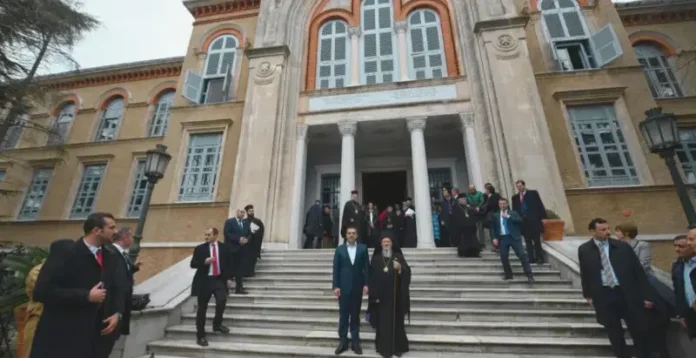Efforts to reopen the Heybeliada Theological School, a historic Orthodox seminary closed for over fifty years, have accelerated following a recent meeting between Turkish President Recep Tayyip Erdoğan and former U.S. President Donald Trump at the White House on September 25.
Erdoğan reportedly told Trump that Turkey was ready to take all necessary steps to facilitate the school’s reopening. Trump responded positively, emphasizing that he would raise the issue to support the initiative.
The discussions highlight growing interest from both governmental authorities and the Fener Patriarchate in restoring the institution.
What is the Heybeliada Theological School?
Founded in 1844 under the Fener Greek Orthodox Patriarchate, the Heybeliada Theological School was originally established as the Higher Orthodox Theology School to train clergy.
Throughout the Ottoman Empire and the Republic of Turkey, the school provided religious education for churches and metropolitans across the region. Its status became a point of debate during the 1922–1923 Lausanne Peace Treaty negotiations.
The school was closed in 1971 after a new regulation on private educational institutions, at which point it offered four years of high school and three years of theology education.
Bartholomeos I, the Fener Greek Patriarch and a native of Gökçeada, graduated from this historic seminary. Over the decades, discussions around the school have resurfaced, particularly during Turkey’s EU membership efforts in the 1990s.
Renewed Efforts for Reopening
The initiative to reopen the school gained momentum in 2024. Erdoğan confirmed in May 2024 that steps were being taken to reopen the seminary, and Turkey’s Minister of Education Yusuf Tekin visited the site later that month, expressing personal support for the project.
In September 2024, Patriarch Bartholomeos declared confidence that the seminary was on the verge of reopening. His subsequent visit to President Erdoğan in December 2024 included discussions specifically regarding the school, with the Patriarchate thanking the Turkish authorities for accelerating the process.
Political and Public Reactions
The school’s reopening remains a politically sensitive topic in Turkey. Some critics argue that the initiative is influenced by external pressures from the European Union and the United States.
Leaders like Ümit Özdağ, head of the Zafer Party, have warned that reopening the school risks creating a “second Vatican in Istanbul.” Meanwhile, Cihat Yaycı, a maritime and global strategy expert, has repeatedly voiced concerns about granting autonomous status to the seminary.
Conversely, some community representatives highlight the historical and educational importance of the institution. Laki Vingas, a representative involved in negotiations, stresses the global religious significance of the school, noting connections from Alaska to Santiago and even Seoul.
Legal Status and Potential Framework
Legal experts point out that there are no insurmountable legal obstacles preventing the school from reopening. According to attorney Kezban Hatemi, the seminary’s closure under the 1971 regulations does not affect its original establishment as a minority vocational school in 1844.
Hatemi explains that ongoing discussions focus on several models, including restoring the school’s original status, creating a theological vocational college, or integrating it into a university system. The Patriarchate’s main objective remains to reopen the school under its historical “private school” status, where administration remains with the Patriarchate while oversight is provided by the Ministry of Education.
Current Condition of the School
The Heybeliada campus, including its unused dormitories and classrooms, has seen restoration work initiated to improve earthquake resilience. Laki Vingas notes that the building is expected to be ready by 2026, aligning with ongoing consultations on the seminary’s operational framework.
“This is not merely about reopening a school; it is about correcting a historical injustice with fairness and integrity,” Vingas emphasizes.
Conclusion
The Heybeliada Theological School’s potential reopening represents a complex interplay of historical, legal, religious, and political factors. While both the Turkish government and the Fener Patriarchate appear committed, debates over legal status, autonomy, and public opinion continue to shape the process.
The upcoming years may finally witness the revival of this landmark institution, blending its rich historical legacy with contemporary educational standards for Orthodox clergy and contributing to broader cultural and interfaith dialogue.

